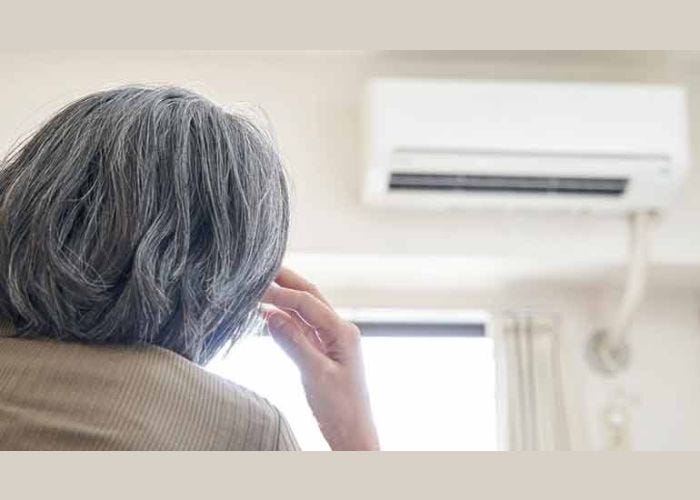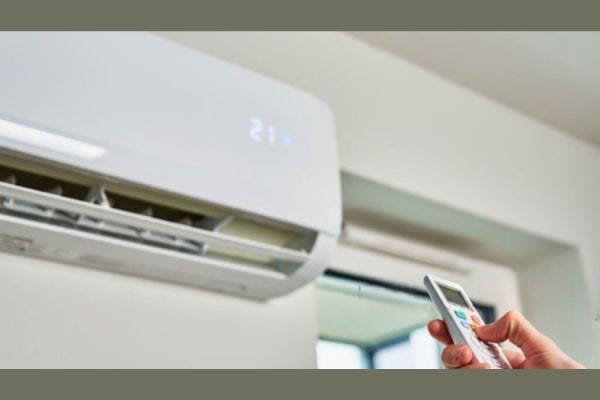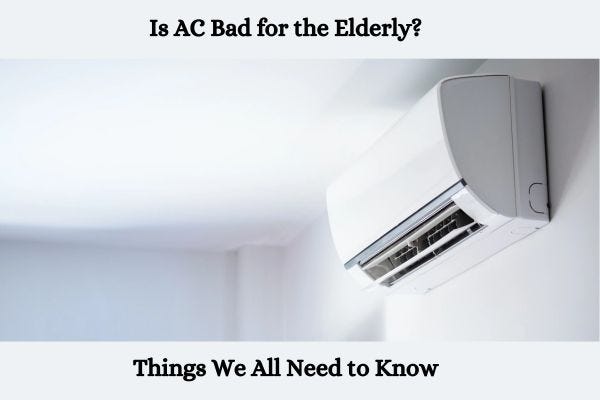Exploring the Health Benefits of Air Conditioning for the Elderly


In present weather conditions, air conditioners are considered an emergency item. Now it is a life-saving household device. It is a necessity for the elderly members of your house. Human bodies become weak and less efficient in controlling and regulating temperature with age. AC keeps the ideal temperature for the elderly during the hot summer.
AC not only cools the air, but it maintains suitable humidity also. It makes breathing easy for people who have respiratory diseases like asthma or COPD.
The health benefits of AC for elderly people are undeniable. AC supports them to live a cool, healthy, happy, and longer life. The article is about the health benefits of AC for the elderly.
Health Benefits of AC on Elderly People


There are many health benefits of AC for the elderly. While it usually controls the temperature, it has some remarkable health benefits, especially for old people. The most surprising benefits of air conditioning for the elderly are:
Temperature and Humidity Regulation:
The primary duty of an AC is to maintain a suitable temperature inside the room. It relieves the sweltering heat and saves the elderly from heat-related health risks.
AC units create a cooling effect by lowering the indoor temperature. It extracts the heat from the air and leaves it outside. This cooling effect is important for promoting health and preventing unwanted illness.
AC also controls humidity. It removes excess moisture from the air which helps to maintain suitable humidity levels, ease breathing, and reduce discomfort.
Another function of the AC unit is air circulation. An AC unit circulates the air inside the room and distributes cool air evenly throughout the space. This air circulation prevents the building of hotspots and maintains a consistent comfortable temperature.
Respiratory Health Benefits:
Healthy airflow for the elderly is essential for breathing. AC improves respiratory health. It stands against risky respiratory conditions. The AC units have filters to trap pollutants, dust, pollen, mold spores, pet dander, allergens, and harmful particles from the air. It ensures a cleaner and healthier indoor environment by circulating the filtered air.
Air conditioners also reduce the chance of respiratory infections. It helps to prevent the common cold, flu, and pneumonia. It promotes a healthier respiratory system by minimizing exposure to harmful airborne particles.
Cardiovascular Benefits:
People think of air conditioners as cooling devices only to cool their rooms in the summer heat. But did you know, it can benefit your heart? Let’s explore how an AC maintains a healthy cardiovascular system.
AC lowers the temperature of the room and your body to keep you cool. It reduces strain on the heart to keep your cardiovascular system good. It also reduces the workload of your heart and improves blood flow.
AC prevents elderly people from dehydration by maintaining a standard humidity level. Proper hydration is crucial for the cardiovascular system of the old aged.
Improved Sleep Quality:
Sound sleep is essential for overall health and well-being. Air conditioning (AC) has revolutionized sleep for people of all ages, especially for the elderly. It creates a comfortable and cool environment which ensures restful sleep.
AC allows elderly individuals to control the temperature they need for sleep.AC maintains an ideal humidity level that helps to fall asleep immediately. Humidity control reduces congestion and ensures easy breathing for the senior member of your house.
Noise can disrupt sleep cycles and lead to broken sleep. Some AC units are designed to operate quietly. It minimizes noise pollution in the bedroom and promotes restful sleep.
Mental Well-being:
The Elderly have a vulnerable mental condition and weak mind. They cannot bear any rough environment. Air conditioning (AC) is not just keeping cool physically; it plays a significant role in maintaining mental health.
Cool temperatures have a positive effect on mood changes. AC creates a comfortable environment, reducing irritability and promoting relaxation. It can help to alleviate symptoms of seasonal affective disorder (SAD). It is a depression type, linked to the lack of sunlight during winter.
The AC unit improves the quality of life, positively impacting mental health.
What AC Temperature is Ideal for the Elderly?
Our bodies become less efficient at regulating temperature with age. That's why the elderly need to stay cool during hot weather.
The ideal AC temperature for the elderly is between 75 and 80 degrees Fahrenheit (24 to 27 degrees Celsius).
Here are a Few Reasons Why This Temperature Range is Ideal
Heatstroke and other heat-related illnesses can be life-threatening for the elderly. Maintaining a cool indoor temperature can help reduce the risk of these illnesses.
High blood pressure can be dangerous for the elderly. AC helps blood pressure regulation. It reduces the risk of heart disease and stroke.
An AC set promotes better sleep. The elderly often have trouble sleeping. A cool bedroom can help them fall asleep more easily. It ensures a better night's rest.
AC improves the mood and cognitive function of the elderly. This is because cool temperatures reduce stress and anxiety. It can also help improve blood circulation.
Can AC be Risky for the Elderly?


In most cases, AC for the elderly is beneficial. But sometimes it can be risky for elderly folks, when cranked up too high, it can make them feel too cold. This can lead to health problems like hypothermia.
Besides, excess use of AC can dry out the air, making it harder for them to breathe. Too hot or too cold weather is detrimental to the health of the elderly. So, finding the right balance with AC is key for their comfort and safety.
It's not just about the temperature either. Some older AC units can lead to mold or bacteria buildup in the vents. Breathing in that stuff can cause respiratory problems or worsen existing ones.
Overall, AC can be a lifesaver for seniors during hot weather. But it's essential to use it responsibly and maintain it to avoid any potential risks to their health.
AC Maintenance: Air conditioners (ACs) are a lifesaver in the hot summer months. But they require regular maintenance to keep them running efficiently. Here's a comprehensive guide to help you maintain your AC unit:
Regular Check-ups: Regular check-ups are vital for proper AC functioning. Schedule annual check-ups with a qualified technician. They can inspect the unit, clean it, and make necessary repairs.
Air Filter Maintenance: The Air filter is important for your AC unit. It filters dust and harmful particles from the air. A dirty filter restricts airflow and reduces cooling efficiency. Replace or clean the air filter every month during peak usage.
Condenser Coil Cleaning: Condenser coil helps to cool the refrigerant gasses and releases the hot air outside. It is placed outdoors.
Cleaning the condenser coils can immediately improve the air quality of your AC unit. Use a soft brush and a mild detergent to clean it. Dirty coils reduce the efficiency.
Refrigerant Level Check: Refrigerant is the cooling element of the AC. The low refrigerant level can affect cooling capacity. You should have a technician check the refrigerant level periodically.
Electrical Connections: Different moving parts inside the AC create vibration. That is why the erosion of parts and electrical connections is normal. Inspect electrical connections for signs of corrosion or loose wires. Tighten them to avoid any sudden shutdown.
Thermostat Calibration: The thermostat reads the temperature level and sends the signal to your AC to increase or decrease the temperature. Ensure your thermostat is calibrated correctly to maintain the desired temperature level.
Outdoor Unit Protection: The outdoor unit of the AC unit is as important as the indoor unit. Keep the outdoor unit free from debris, leaves, and vegetation, and clear at least 2 feet of space around it.
Lubrication: The moving parts of the AC may become jammed or wear out after a certain time. Lubricate the moving parts of the air conditioner as per the manufacturer's recommendations. This reduces friction and wear.
Condensate Drain Maintenance: The condensate drain is the water disposal line. If the line is unclear, it may produce ice and hamper your AC operation. Ensure the condensate drain is clear to prevent water buildup and potential mold growth.
Ductwork Inspection: Inspect ductwork for leaks or blockages. Properly sealed ducts improve efficiency.
Annual Tune-up: Your AC remains unused in the winter season. Schedule a professional tune-up before the start of the summer season. This ensures optimal performance.
Energy-efficient Settings: An energy-efficient setting is crucial to saving energy bills and AC health. Use energy-saving features like programmable thermostats and ceiling fans to reduce energy consumption. It will also support your AC in the summer.
Avoid Overuse: Don't run the AC at excessively low temperatures for extended periods. This puts unnecessary strain on the unit.
Professional Repairs: If you notice any issues like strange noises, reduced cooling, or leaks, call a professional for repairs.
Warranty and Manuals: Keep your AC's warranty information and user manuals for future reference.
Regular maintenance keeps your AC running smoothly and extends its lifespan. It also saves energy and improves indoor air quality.
By following these tips, you can ensure your AC unit provides cool comfortable air for years.
FAQs
Is AC needed for the elderly?
Elderly people’s health conditions are vulnerable to dehydration, heat stroke, and other heat-related illnesses because their bodies cannot regulate temperature like the young.
Air conditioners maintain suitable indoor weather and reduce the risk of those illnesses. So AC is necessary for the elderly.
What temperature is too hot for seniors?
People over 60 years old are vulnerable to extreme heat and cold. They can feel overheated at 80 degrees.
What is the ideal temperature for a newborn?
A baby's health is sensitive to room temperature. The ideal temperature for a newborn baby is 20 to 22 degrees Celsius or 68 to 72 degrees Fahrenheit.
Which AC is best for the elderly?
The best AC for the elderly is the energy-efficient personal air conditioner. It keeps the room cool without increasing the significant energy bill. You can also try Inverter AC for your family members. It also helps to keep the best temperature for them.
We suggest considering the Haier 1.5-ton AC or LG Dual Inverter AC for your loving elderly.
Conclusion
Air conditioners have become an emergency part of daily life in modern days. The temperature now is higher than in the past and increasing every year. In these changing weather conditions, elderly people are at high risk of temperature-related diseases. A perfect air conditioner set can relieve them from these rough weather effects.
Visit our House of Butterfly to choose an AC for your loving elderly one. It will make them happy and comfortable in these tough temperatures. Besides, it prevents many diseases like asthma and allergies.
We hope you enjoyed today's session and stay with us for the next.

